We managed to pack our suitcases, said goodbye to Cacador, and headed to Fraiburgo this morning. The city is strongly influenced by European immigrants, especially Germans and Italians, which we immediately saw in the buildings' architecture. It is famous in Brazil for the large production of apples in the winter season - yay, firm apples! Apples are the base of the Fraiburgo economy, being responsible for 60% of the total state production and 40% of the national production. The city also produces honey in large quantities; there are about 15.000 honeycombs to pollinate 7 million apple trees (hi, Katie Tobin!). Fraiburgo is only 50 years old, and it has 37,000 inhabitants.
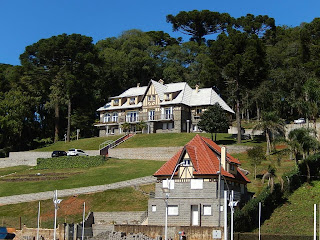 |
| Hello, Fraiburgo |
We met our host families and transferred the luggage to cars before boarding Fraiburgo's version of a duckboat on steroids (Boston Strong!). This all-terrain vehicle took us on thrill inducing tour of Renar Forest.
Deep in the forest, our first stop was an ecumenical church, gifted to the Frei on his 80th birthday by the architect. The walls are crafted of reforested pine, held together not by nails, but by a Japanese method of piecing and locking the wood together; the bottom of the walls is volcanic rock from the region. Mass is not held in this church, but many use it for weddings.
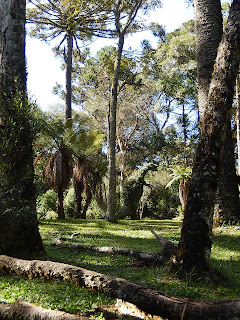 |
| Our version of gorillas in the mist: dinosaurs in the jungle |
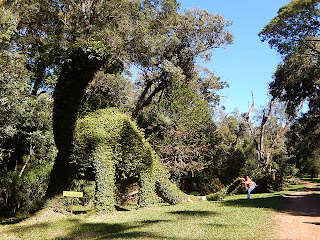 |
| Chris, you cant get that through TSA |
Back on the mammoth "bus", we headed over to the farm, where we found ducks, sheep, deer, bucks, and African antelope. If the antelope get frightened, they can jump 3 meters in the air!
 |
| You mess with the bull, you get the horns |
I think the driver enjoyed hearing our screams as he drove through lakes, down incredibly steep hills at lightening speed, and through trees, causing us to hit the deck, lest we lose our heads. Three new words for today: cuidado (careful!), segura firme (hold tightly!), and abaixa (duck!).
 |
| Yes, we went THROUGH this |
 |
| And down this |
 |
| Abaixa! |
.JPG) |
| Abaixa! |
After lunch with our host families, we headed to Grupo Fisher which is one of the largest apple producing plants in the region. 95% of their product is fuji or gala; Brazilians don't like green fruit. They harvest the product during January, February, March, and some of April, but have to keep and sell product year-round. Using controlled atmospere storage, they can keep Gala apples fresh until September (about 6 months) and Fuji until January 2014 (12 months). Using 120-130 small growers plus their own crop, they process and sell 120,000 tons of apples annually. They are focused primarily on supplying the Brazilian market, alhough they export about 5% of their product to India, China, and the middle east. Interestingly enough though, 99% of their apple juice is exported. In addition to apples, Fisher also processes kiwi, although in a much smaller quantity (1,000 tons annually - however, last year due to frost, they only produced 80 tons).
 |
| Sorting the apples by hand |
This factory had recently added a news machine which dramatically increased speed and analytics while automating the process. As the apples went through the machine, 70 images were taken of each apple, regisering a comprehensive analysis and assessment of each fruit's size, weight, defects, color, etc.
 |
| Photographing the apples |
With this information, the machine was able to categorize each apple into 12 different size categories and 3 different classes for uniformity of product and packaging. The sales team then sells the 36 different products to businesses based on market segmentation (ATTN:marketing dork alert). For example, Americans tend to like bigger apples and have the money to pay for class 1 quality. On the other hand, India and China tend to purchase the smaller apples and class 2 or class 3 quality because a) these apples are cheaper and b) you will get more apples per kilo.
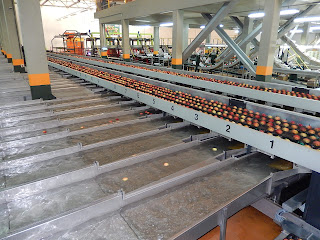 |
| The apples are being categorized into one of 36 different groupings |
 |
| Sizes and classes together |
To geek out on you once more with Fisher's marketing prowess, we learned that historically, Brazilians don't buy bagged fruit, as was learned when a competitor tried and went under in the process. Fisher, seeing the opportunity, purchased the equipment to bag the apples, partnered with a popular Brazilian comic (Archie and Jughead comic, not Jerry Seinfeld comic), and now sell more of Turma de Monica (Monica's gang) bagged apples than any other product on their line. Incluing all their apple products, they produce 2,000 boxes/hour for 20 hours/day, thereby selling 5-5.5MM boxes/year.
 |
| Monica apples! |
After tasting the product at the end of our tour, we headed to Renar Moveis, a furniture producer that sells both in Brazil and in the US (in fact, the owner's brother was in High Point, NC while we walked through the factory!). Using the American pine tree, harvested from around the region, they cut, process, produce and sell gorgeous wooden bedroom, dining room, and living room furniture.
 |
| Cut wood, ready for production |
 |
| Sizing the pine |
 |
| Roberto Frey, co-owner of Renar Movies |
 |
| Staining the dining room tables |
 |
| Renar's showroom (hi, Sebastian!) |
 |
| Yes, please :) |
If you see Brazilian Furniture Group (BFGRoberto Frey, thates, check it out!







.JPG)















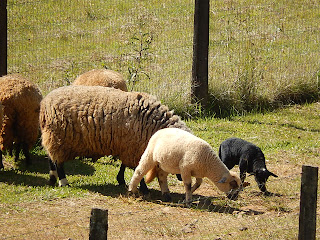



Amigos dos EUA !
ReplyDeleteNós adoramos conhecê-los e ficamos muito felizes em recebê-los. Fraiburgo agradece a visita e está de portas abertas! E depois de voltarem para os EUA ... continuem com as três palavras em suas mentes, FOREVER! rsrs beijos Roberta